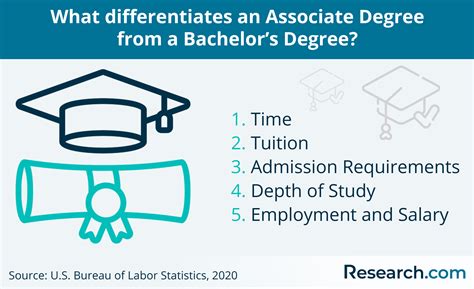A.S. Degree vs A.A.S. Degree: Which One is Right for You?
Introduction

When it comes to pursuing higher education, you have a plethora of options to choose from. Among them, associate degrees are gaining immense popularity, primarily due to their shorter duration and affordability compared to bachelor’s degrees. However, within the realm of associate degrees, there are two main types that often leave students puzzled: A.S. (Associate of Science) and A.A.S. (Associate of Applied Science). This article aims to shed light on the key differences between these two degrees, empowering you to make an informed decision that aligns with your career aspirations.
A.S. Degree (Associate of Science)
An A.S. degree is designed to provide a foundation in the liberal arts and sciences, offering a broader educational experience. It typically includes general education courses such as English, Mathematics, History, and Social Sciences. The focus is on developing critical thinking, problem-solving skills, and a strong academic foundation. Upon completion, graduates are well-prepared to pursue a bachelor’s degree or enter the workforce in fields that require a solid understanding of fundamental principles.
A.A.S. Degree (Associate of Applied Science)
An A.A.S. degree, on the other hand, is tailored towards specific career paths. It emphasizes hands-on training and practical skills, with a curriculum designed to meet the requirements of specific industries. A.A.S. programs typically include courses in technical areas such as Computer Science, Engineering Technology, Health Sciences, or Business Administration. Graduates are equipped with the necessary knowledge and skills to enter the workforce directly in their chosen field.
To further clarify the distinctions between A.S. and A.A.S. degrees, let’s delve into their key differences:
| Characteristic | A.S. Degree | A.A.S. Degree |
|---|---|---|
| Focus | Liberal arts and sciences | Career-specific |
| Curriculum | General education courses | Technical and practical courses |
| Duration | Usually 2 years | Usually 2 years |
| Career Path | Prepares for bachelor’s degree or entry-level positions | Prepares for direct entry into workforce |
| Transferability | Easier to transfer to a bachelor’s program | Limited transferability |
| Job Outlook | Positions typically require a bachelor’s degree | Positions often require only an A.A.S. degree |
The decision between an A.S. and an A.A.S. degree depends on your individual goals and career aspirations. Here are some factors to consider:
- Your Career Goals: If you plan to pursue a bachelor’s degree in a field such as Business, Education, or Psychology, an A.S. degree is a suitable pathway. However, if you are eager to enter the workforce quickly in a specific field, an A.A.S. degree is an excellent option.
- Transferability: A.S. degrees are generally more transferable to bachelor’s programs than A.A.S. degrees. This is because they provide a broader educational foundation.
- Job Market: The job market for A.S. graduates is often competitive, as employers may prefer candidates with a bachelor’s degree. A.A.S. graduates, on the other hand, may have an advantage in entry-level positions due to their specialized skills and training.
According to the U.S. Bureau of Labor Statistics, the following A.A.S. degree programs are projected to experience high growth in the coming years:
- Computer Support Specialists
- Sonographers
- Medical Assistants
- Dental Hygienists
- Administrative Assistants
Whether you choose an A.S. or an A.A.S. degree, it is essential to weigh your options carefully and select the path that best aligns with your career goals. Both types of degrees offer valuable pathways to higher education and fulfilling careers. By considering the factors discussed in this article, you can make an informed decision that will propel you towards success.
Transferring from an A.A.S. Degree to a Bachelor’s Program
While A.A.S. degrees are typically not designed for direct transfer to bachelor’s programs, some colleges and universities offer bridge programs that allow A.A.S. graduates to complete additional coursework to qualify for transfer.
Occupational Outlook Handbook
The U.S. Bureau of Labor Statistics publishes the Occupational Outlook Handbook, which provides detailed information on hundreds of occupations, including job outlook, earnings, and educational requirements. This resource can be invaluable for exploring potential career paths.
Career Counseling
If you are unsure which degree is right for you, consider seeking guidance from a career counselor. They can provide personalized advice based on your interests, skills, and career aspirations.
Statistics on Associate Degrees
- In 2020, over 1.3 million associate degrees were awarded in the United States.
- A.A.S. degrees accounted for approximately 60% of all associate degrees.
- The median annual salary for A.A.S. graduates is around $50,000.
- The median annual salary for A.S. graduates is around $55,000.
Glossary
- Liberal Arts: A group of academic disciplines that emphasize the study of languages, literature, philosophy, history, and social sciences.
- Applied Science: A field of study that focuses on applying scientific principles to solve practical problems.
